In the realm of hair care, split ends are a common nemesis, leaving hair looking frayed, dry, and prone to breakage. Understanding the causes and effects of split ends is the first step towards finding effective remedies. From natural ingredients to protective hairstyles, this comprehensive guide unveils the best home remedies for split ends, empowering you with knowledge and practical solutions to restore hair health and regain luscious locks.
Embark on a journey to revitalize your hair, as we delve into the world of split ends, exploring their types, causes, and consequences. Discover the benefits of using natural remedies over chemical treatments and uncover a treasure trove of effective home remedies that utilize the power of nature to repair and rejuvenate damaged hair.
Let’s embark on this quest for healthy hair, leaving split ends in the past.
Overview of Split Ends

Split ends, a common hair problem, occur when the hair shaft splits into two or more strands. This can be caused by various factors, including environmental damage, chemical treatments, heat styling, and improper hair care practices. Split ends can make hair appear dry, frizzy, and prone to breakage, leading to overall hair health deterioration.
Types of Split Ends
There are three main types of split ends:
- Single Split Ends: In this type, the hair shaft splits into two strands, creating a Y-shaped appearance.
- Double Split Ends: Here, the hair shaft splits into three strands, resulting in a T-shaped appearance.
- Triple Split Ends: This is the most severe type, where the hair shaft splits into four or more strands, creating a frayed, brush-like appearance.
The following table provides a visual representation of the three types of split ends:
| Type of Split End | Appearance |
|---|---|
| Single Split End | Y-shaped |
| Double Split End | T-shaped |
| Triple Split End | Frayed, brush-like |
Home Remedies for Split Ends
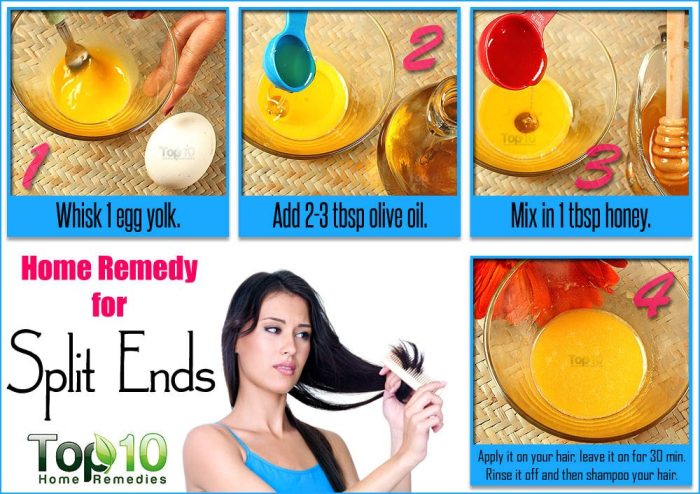
Natural remedies for split ends offer a gentle and effective way to heal and prevent further damage to hair. These remedies harness the power of natural ingredients to repair and strengthen hair strands, promoting healthier and more manageable hair.
Compared to chemical treatments, home remedies are generally milder and less likely to cause harsh side effects. They often utilize ingredients that are easily accessible, affordable, and safe for regular use. Additionally, home remedies allow for a more personalized approach, as you can select ingredients that specifically address your hair type and needs.
Natural Oils
- Coconut Oil: Rich in lauric acid, coconut oil penetrates deep into the hair shaft, providing intense hydration and nourishment. It helps repair damaged hair, reduce split ends, and protect against future damage.
- Olive Oil: Known for its moisturizing and antioxidant properties, olive oil helps repair damaged hair cuticles, reduce frizz, and add shine. It is also effective in preventing split ends.
- Argan Oil: Packed with antioxidants and essential fatty acids, argan oil helps strengthen hair, reduce breakage, and prevent split ends. It also adds a healthy shine to the hair.
Natural Masks
- Avocado and Honey Mask: Avocado is rich in vitamins and fatty acids, while honey is a natural humectant. Together, they create a nourishing mask that deeply conditions the hair, reduces split ends, and promotes healthy hair growth.
- Banana and Yogurt Mask: Bananas are rich in potassium and natural oils, while yogurt provides protein and moisture. This mask helps repair damaged hair, reduce split ends, and add volume and shine.
- Egg and Olive Oil Mask: Eggs are rich in protein, while olive oil is rich in antioxidants. This mask helps strengthen hair, reduce split ends, and add shine. It also helps promote hair growth.
Lifestyle Changes
- Trim Regularly: Regular trims help remove split ends before they travel up the hair shaft, preventing further damage.
- Use a Wide-Tooth Comb: Avoid using brushes on wet hair, as this can cause breakage. Instead, use a wide-tooth comb to detangle hair gently.
- Protect Hair from Heat: Excessive heat from styling tools can damage hair and cause split ends. Use heat protectant sprays and avoid using high heat settings.
- Healthy Diet: A healthy diet rich in vitamins, minerals, and essential fatty acids can help promote healthy hair growth and prevent split ends.
DIY Hair Masks for Split Ends
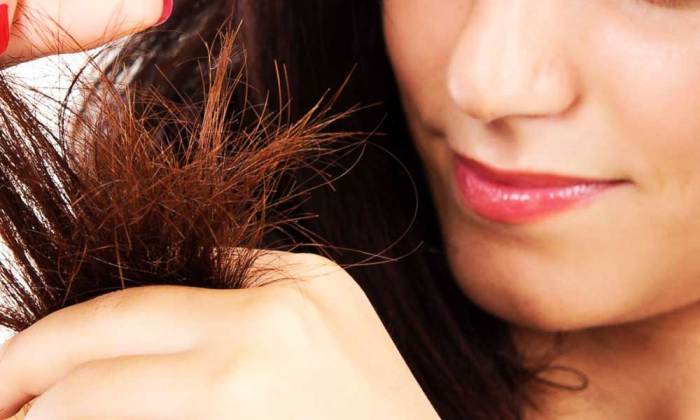
Hair masks provide intensive conditioning and nourishment to hair, helping to repair split ends and prevent further damage. Natural ingredients like avocado, coconut oil, honey, and banana are rich in vitamins, minerals, and fatty acids that deeply moisturize and strengthen hair, promoting healthy growth and preventing split ends.
To create a DIY hair mask at home, follow these steps:
Ingredients and Preparation:
- Avocado and Honey Mask: Mash half an avocado and mix it with 2 tablespoons of honey. Apply the mixture to damp hair, focusing on the ends, and leave it on for 30 minutes before rinsing.
- Coconut Oil and Yogurt Mask: Combine 3 tablespoons of coconut oil with 2 tablespoons of plain yogurt. Apply the mixture to dry hair, starting from the ends and working your way up. Cover your hair with a shower cap and leave it on for at least an hour before rinsing.
- Banana and Almond Oil Mask: Blend one ripe banana with 2 tablespoons of almond oil. Apply the mixture to damp hair, starting from the ends and working your way up. Leave it on for 30 minutes before rinsing.
Benefits of DIY Hair Masks:
- Deep Conditioning: DIY hair masks provide deep conditioning to hair, replenishing moisture and nutrients, leaving it soft, smooth, and manageable.
- Split End Repair: The natural ingredients in DIY hair masks help to seal split ends and prevent further breakage, promoting healthy hair growth.
- Damage Protection: DIY hair masks create a protective layer on the hair shaft, shielding it from environmental damage, heat styling, and chemical treatments.
- Scalp Health: Some DIY hair masks also contain ingredients that benefit scalp health, such as coconut oil, which has antibacterial and antifungal properties, and honey, which is known for its soothing and moisturizing effects.
Comparison of DIY Hair Masks:
| Mask | Benefits | Ingredients |
|---|---|---|
| Avocado and Honey Mask | Deep conditioning, split end repair, damage protection | Avocado, honey |
| Coconut Oil and Yogurt Mask | Deep conditioning, split end repair, scalp health | Coconut oil, yogurt |
| Banana and Almond Oil Mask | Deep conditioning, split end repair, damage protection | Banana, almond oil |
Protective Hairstyles for Split Ends
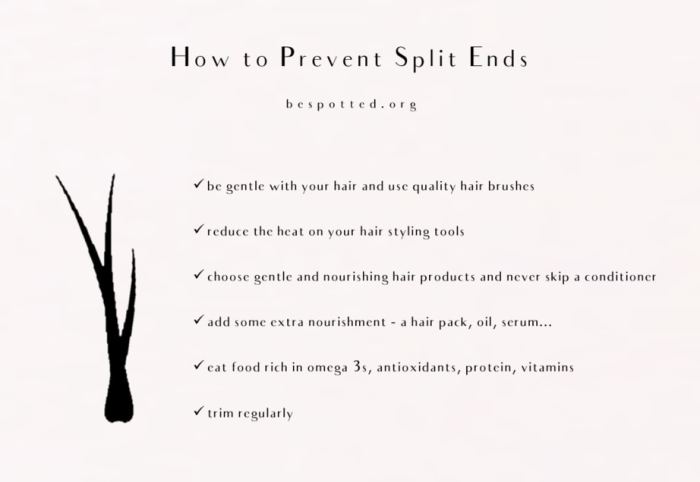
Protective hairstyles play a vital role in preventing and managing split ends. By keeping the hair secured and minimizing friction, these styles can reduce the chances of hair breakage and keep the ends healthy.
Here are some popular protective hairstyles that can help prevent split ends:
Braids
Braids are a versatile and stylish way to protect hair from split ends. They keep the hair strands together, reducing friction and preventing tangles. Braids can be done in various styles, such as cornrows, French braids, and fishtail braids, making them suitable for different hair types and lengths.
Buns
Buns are another effective protective hairstyle for split ends. They keep the hair neatly gathered at the top of the head, minimizing friction and reducing the risk of breakage. Buns can be done in different styles, such as high buns, low buns, and messy buns, depending on personal preference.
Twists
Twists are a protective hairstyle that involves wrapping two strands of hair around each other. They are similar to braids but are looser and less structured. Twists can be done on wet or dry hair and can be styled in various ways, such as flat twists, chunky twists, and rope twists.
Tips for Maintaining Healthy Hair While Wearing Protective Hairstyles
- Moisturize regularly: Keep the hair hydrated by applying a leave-in conditioner or hair oil to the scalp and hair strands. This will help prevent dryness and breakage.
- Avoid tight hairstyles: While protective hairstyles are beneficial, avoid wearing them too tightly. Tight hairstyles can put stress on the hair and lead to breakage.
- Take breaks: It is essential to take breaks from protective hairstyles every few weeks to allow the hair to breathe and recover. This will help prevent scalp irritation and hair loss.
- Use gentle hair care products: Opt for gentle shampoos and conditioners that are free from harsh chemicals. Avoid using products that contain sulfates, parabens, and alcohol, as these can strip the hair of its natural oils and lead to dryness and breakage.
Healthy Hair Care Routine for Split Ends

Split ends are a common hair problem that can be caused by various factors, including heat styling, chemical treatments, and improper hair care practices. To prevent and treat split ends, it is essential to adopt a healthy hair care routine that includes regular trims, proper brushing techniques, avoiding heat styling, and using nourishing hair products.
Regular Trims
Regular trims are crucial for maintaining healthy hair and preventing split ends. Trimming the hair removes the damaged ends, allowing the hair to grow healthier and stronger. It is recommended to get a trim every 6-8 weeks, or more frequently if the hair is prone to split ends.
Proper Brushing Techniques
Brushing the hair correctly can help prevent split ends by detangling the hair gently and avoiding breakage. Start by brushing the ends of the hair, working your way up to the roots. Use a wide-toothed comb or a soft-bristled brush to avoid causing damage to the hair.
Avoiding Heat Styling
Heat styling tools, such as blow dryers, flat irons, and curling irons, can cause significant damage to the hair, leading to split ends. If you must use heat styling tools, be sure to apply a heat protectant spray to the hair beforehand and use the lowest heat setting possible.
Nourishing Hair Products
Using nourishing hair products can help strengthen the hair and prevent split ends. Look for products that contain ingredients like keratin, argan oil, coconut oil, and shea butter, which can help hydrate and repair damaged hair. Avoid products that contain harsh chemicals, such as sulfates and parabens, as these can strip the hair of its natural oils and make it more prone to split ends.
Weekly Hair Care Routine
A weekly hair care routine can help prevent and treat split ends by providing the hair with the necessary nutrients and moisture.
- Start with a gentle shampoo and conditioner. Avoid harsh shampoos that can strip the hair of its natural oils.
- Apply a deep conditioning mask once a week to provide intense hydration and nourishment to the hair.
- Use a leave-in conditioner or hair oil to keep the hair moisturized throughout the day.
- Protect the hair from the sun’s UV rays by wearing a hat or scarf when outdoors.
- Avoid tight hairstyles, such as ponytails and buns, as these can put stress on the hair and lead to breakage.
By following a healthy hair care routine and adopting proper hair care practices, you can prevent and treat split ends, keeping your hair healthy and looking its best.
Split End Prevention Tips
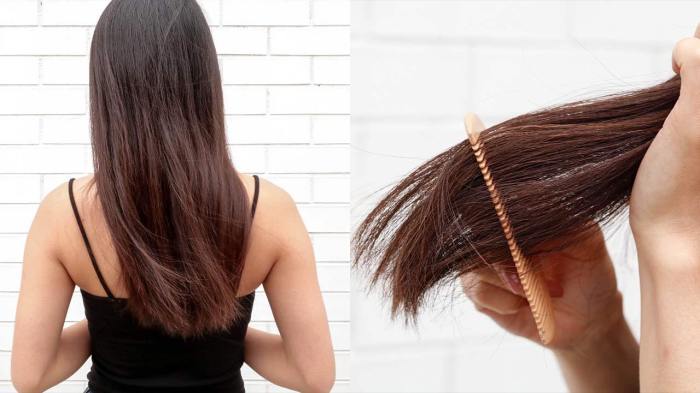
Split ends are a common hair problem that can make hair look dry, brittle, and unhealthy. While split ends can be treated, prevention is the best way to keep hair healthy and strong. Here are some practical tips to help prevent split ends:
Use Wide-Toothed Combs
Wide-toothed combs are less likely to snag and break hair than fine-toothed combs. When combing hair, start at the ends and work your way up to the roots. This will help to prevent breakage and split ends.
Avoid Harsh Chemicals
Harsh chemicals, such as those found in some hair dyes, perms, and styling products, can damage hair and make it more prone to split ends. If you must use harsh chemicals, be sure to follow the directions carefully and use a deep conditioner afterwards to help repair any damage.
Protect Hair from Sun Exposure
The sun’s UV rays can damage hair and make it more prone to split ends. When spending time outdoors, wear a hat or scarf to protect your hair from the sun. You can also use a leave-in conditioner with UV protection to help shield your hair from the sun’s harmful rays.
Checklist of Preventive Measures
- Use wide-toothed combs.
- Avoid harsh chemicals.
- Protect hair from sun exposure.
- Get regular trims.
- Use a deep conditioner regularly.
- Eat a healthy diet.
- Manage stress.
Infographic: Key Tips for Preventing Split Ends
Here is an infographic summarizing the key tips for preventing split ends:
[Create an infographic summarizing the key tips for preventing split ends]
Last Recap
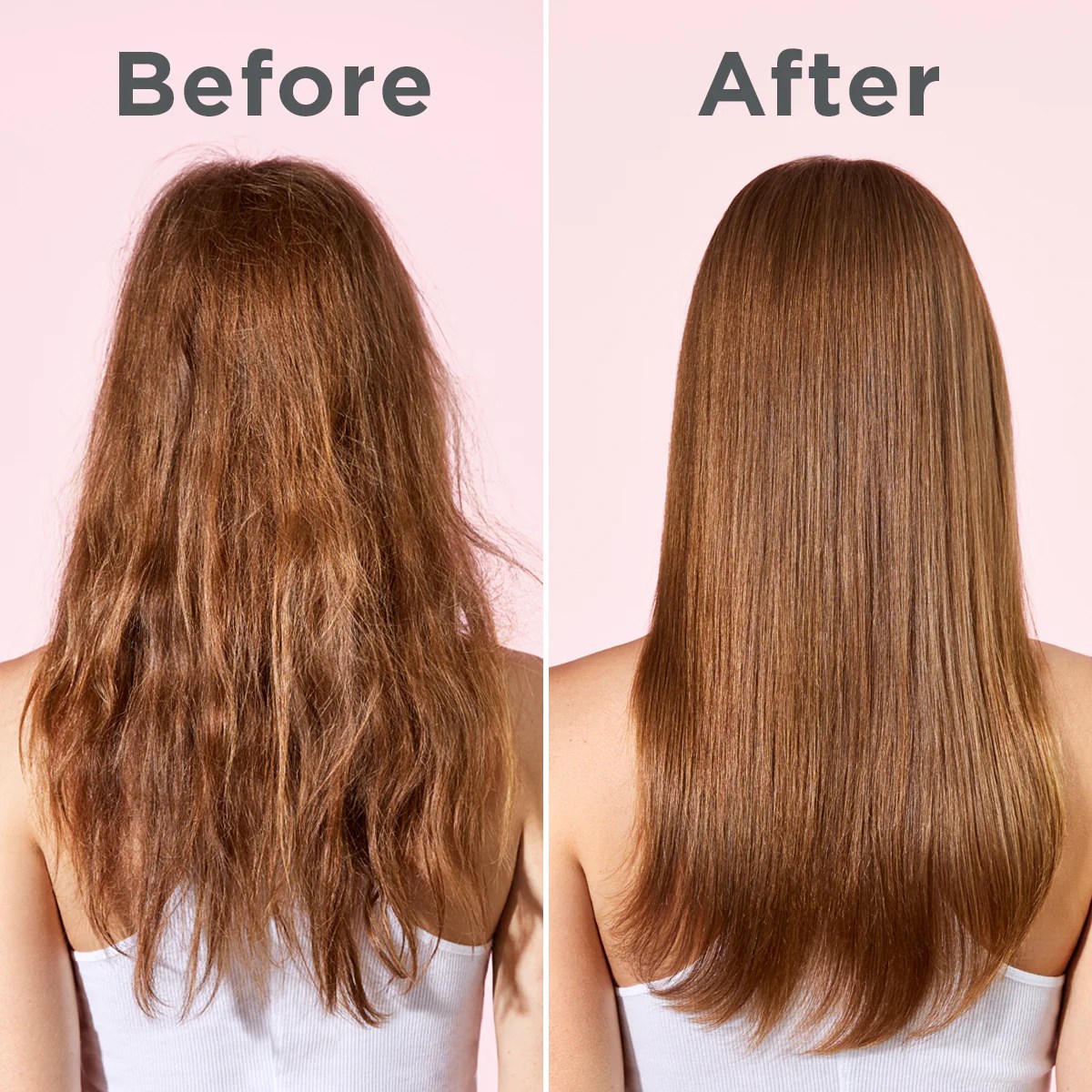
As we conclude our exploration of split ends and their remedies, it’s evident that embracing natural solutions and adopting a holistic approach to hair care are key to achieving healthy, resilient hair. By incorporating these home remedies and preventive measures into your hair care routine, you can bid farewell to split ends and welcome strong, lustrous locks.
Remember, consistency and patience are virtues in the pursuit of hair health. Embrace the journey, enjoy the process, and let your hair flourish with renewed vitality.
FAQ Summary
What causes split ends?
Split ends arise due to various factors, including excessive heat styling, chemical treatments, harsh brushing, sun exposure, and improper hair care practices. These factors damage the hair’s protective layer, leading to breakage and the formation of split ends.
How can I prevent split ends?
Prevention is key in the battle against split ends. Regular trims, gentle brushing, avoiding heat styling, using wide-toothed combs, and protecting hair from sun exposure are all effective preventive measures.
What are the benefits of using home remedies for split ends?
Home remedies for split ends harness the power of natural ingredients to repair and strengthen damaged hair. They are often gentler and more affordable than chemical treatments, and they can be easily incorporated into your hair care routine.
How often should I use home remedies for split ends?
The frequency of using home remedies for split ends depends on the severity of the damage and your hair type. Generally, it’s recommended to use them once or twice a week for best results.



